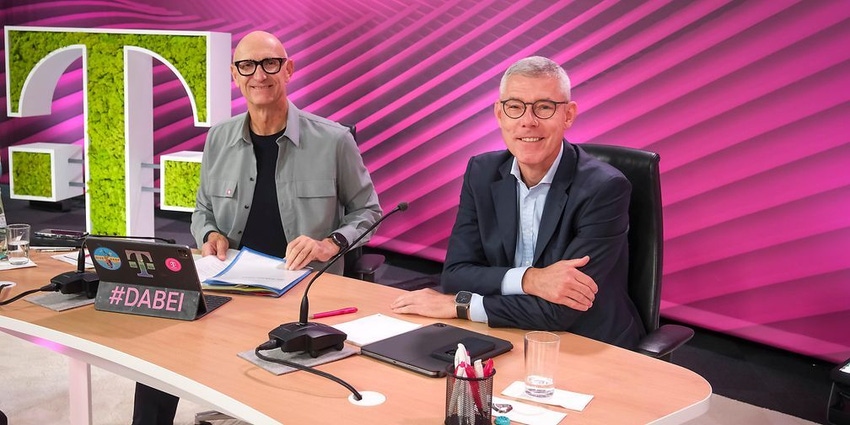DT CEO optimistic on open RAN, Huawei still a worry
The German group's CEO, Timotheus Höttges, says open RAN is gaining traction, while DT continues to grapple with the potential fallout of a growing antipathy to 'high-risk' vendors in Germany and the EU.

Open RAN technology has been on something of a rollercoaster ride in recent years as vendors and operators try to get their heads around how this multivendor approach to building mobile networks can be implemented.
Deutsche Telekom was a prominent proponent of open RAN when the concept was at what Gartner calls the peak of inflated expectations. Back in the summer of 2020, DT Group CEO Timotheus Höttges was even calling on German authorities to mandate the use of open RAN (or O-RAN) specifications, designed to support interoperability between different suppliers.
DT subsequently built an "O-RAN Town" in Neubrandenburg where it could test drive the technology at about 25 sites before unleashing it on the rest of the country. Then, in early 2023, the German telco published a status update on the technology concept and its readiness for commercial deployment. At the time, the assessment was that open RAN was still not good enough, and DT scrapped plans for a wide-scale deployment of open RAN this year.
During DT's Q2 2023 earnings call on Thursday, Höttges nevertheless sounded a somewhat more optimistic note about open RAN's development and said good progress is being made. He did not go into too much detail, other than noting that the partner here is Nokia, but indicated that open RAN will be scaled up next year "in a significant magnitude" to demonstrate its readiness for the mass market.
"We see that open RAN is really gaining traction. Three hundred telcos, vendors, academics are members of our consortium here. And the technical things are on a good way to getting solved, so it looks encouraging," he said.
The "consortium" referred to by Höttges is the O-RAN Alliance, whose members aim to jointly develop a "sustainable O-RAN ecosystem."
The Huawei question
In the meantime, however, DT has built an extensive 5G network – covering about 95% of the German population, it claims – using traditional technology. The "problem" here is that controversial Chinese vendor Huawei is understood to figure prominently, accounting for almost 60% of the 5G RAN equipment deployed so far, according to data from Strand Consult, a Danish firm. The only other big RAN vendor is Sweden's Ericsson, providing old-fashioned gear.
Although DT and Höttges have tended to defend the operator's use of Huawei, recent German and European Union moves are prompting the operator to clarify the degree to which equipment from vendors deemed to be "high risk" sits in its network.
In Germany, for instance, the Federal Office for Information Security (BSI) has gained new authority following the signing into law of the IT Security Act 2.0. Specifically with regard to mobile networks, the Act contains a regulation on prohibiting the use of certain critical components to protect public order or security in Germany.
"Network operators must also meet specific high-level security requirements, and critical components must be certified. Among other things, the law ensures information security in 5G mobile networks," the BSI said.
Höttges noted that while he sees "no decoupling intention from the German government," there is nevertheless "an argument about sovereignty which the companies should care about."
"Therefore I do not see that there is any kind of aspiration for banning any new vendors here. There is a security element, which we always have to consider. And Deutsche Telekom is fulfilling that. On the core infrastructure of our mobile network, we are using Ericsson and Mavenir. In the IP aggregation network, we don't have any kind of China vendor," he said.
In the access nodes of the RAN infrastructure, however, he conceded that there is "one component" which might concern the BSI, "which is the configuration management, and we are on the way of becoming independent here as well. So we don't see an immediate impact on our business from a political agenda."
Although Höttges seemed intent on downplaying the situation, DT's interim report for 2023 includes a fairly lengthy clarification of the corporate risk presented by Chinese vendors.
For instance, the operator notes that in March the Federal Ministry of the Interior and Community (BMI) asked all German network operators to identify all 5G components from Huawei and ZTE that have already been installed "and map critical functions," and to notify the authority accordingly.
"Although BMI speaks of an impartial review, there is public speculation over the possibility that, in the second half of 2023, the findings could lead to a ban on deploying Chinese equipment in further parts of the German network classed as potentially critical, within certain time frames. The replacement of these components could incur high costs," DT said.
The Group added that in other countries, such as Austria, the Czech Republic, and Poland, "it is still possible that critical infrastructure suppliers will have to be replaced within specific deadlines."
"Compared to the end of 2022, we already raised the risk significance of the risk category 'Strategic implementation and integration' from high to very high in the first quarter of 2023, due to the extensive costs that could be incurred should there be a retrospective order to remove components," DT said.
Related posts:
— Anne Morris, contributing editor, special to Light Reading
Read more about:
EuropeAbout the Author(s)
You May Also Like












